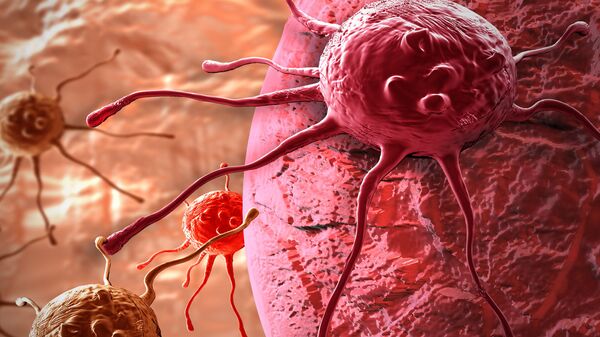Judy Perkins was given three months to live, but thanks to a new revolutionary treatment she is still alive and cancer-free two years later. She was treated by an American team of doctors as part of research on a new method of individual treatment that used 90 billion of her own cancer-killing cells to target tumors that had spread all over her body.
Sputnik: How significant of a trial was this?
Justin Stebbing: Statistically advances in medicine, science and patient care occur in small steps; so in breast cancer, for example, it’s not just about better surgery or chemotherapy, it's about better surgery, chemotherapy, radiotherapy, hormonal therapy, targeted therapy, anti-body therapy and in some cases immunotherapy, but in my career as we try to personalize medicine, which means treating the right person at the right time with the right drugs and the right tumor, as we try to make medicine individual we're finding that immunotherapy is really a massive step forward. Now this approach … is not especially new and certainly in the clinic I have dozens of patients that have been given three months to live that respond exceptionally well to unconventional treatment offered and all their tumors disappear, but I would never say that those individuals, those women with breast cancer, are cured, so we have to be very careful using the word cure, the only definition of the word cure that works for me is living till old age and dying of something else, having said that, this approach using T cells from the patient's own tumors, expanding certain tumor killing T cells, we're infusing them into the patient and seeing disappearance of tumors is a very promising approach, particularly in people that have exhausted conventional therapeutic options, but one patient is not enough to give us conclusions, we need to see results in hundreds of patients and results in clinical trials because often in early drug development, in early therapy development, we will see very, very impressive responses, but when we study these in larger numbers of people it’s less impressive, so what I’d like to know here is how long will her remission last for and what future treatment options are there, if the remission is lifelong then that is a cure, but I think that is very, very unlikely.
READ MORE: Researchers Develop Ion Acceleration Method for Improved Cancer Treatment
Sputnik: Of course this treatment does remain experimental and will involve a lot more work, but can you give us an idea of how this particular therapy actually works? I understand that the patient’s tumor is genetically analyzed and there seems to be very difficult process whereby they identify some changes that might make the cancer visible to the immune system, in this particular patient out of 62 genetic abnormalities in the patient only four of them were potential lines of attack, can you explain what this is all about?
Justin Stebbing: So I think of a cancer cell like a map, one cell like a map and what we’re trying to work out in the map is which towns or cities are not working properly and then we make bombs and missiles to those towns and cities, the problem is we don’t know which towns and cities are controlling the particular cell and that’s why they only found four, what we call driving mutations as opposed to passenger mutations, but in this case a fresh sample, and a large part of the patients tumor is taken, and the tumor is sequenced so we can understand the bits that are most likely to respond to the immune system; now a lot of cancer is devoted to hiding itself from the immune system, but where it’s different is we take out the T cells and we magnify and expand the T cell that attack the tumor and that are able to overcome the way cancer cells hide from the immune system; and in doing so, in achieving this and then reinfusing them back into the patient we can actually overcome the cancer's natural resistance mechanisms. We have to give the patients chemotherapy anyway to ablate their own immune systems, not on a high dose, actually on a low dose, but it’s a very promising approach because you’re using, as opposed to chemotherapy that killed rapidly dividing cells and any rapidly dividing cells, you’re using the patient's own immune system, harnessing it to kill cancer, so your own immune system is performing a biopsy of the cancer every second of the day, your own immune system is personalized, it's the ultimate personalized medicine because it’s your own, so by using that we can actually make huge strides in treating patients with cancer and harnessing patients’ immune systems to kill cancer.



